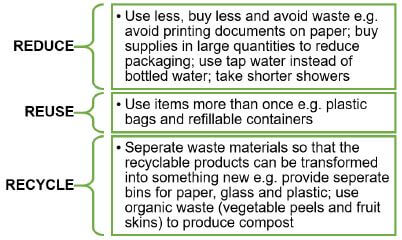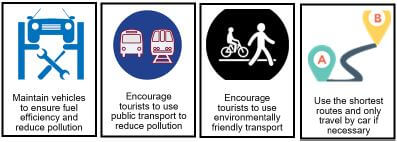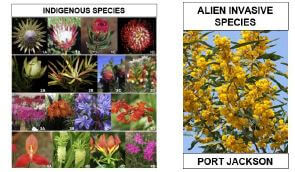| The concept and background of the triple bottom line approach |
- Triple bottom line refers to the three (triple) measures of business performance: economic (profit), environmental (planet) and social (people).

- The traditional way to measure a business’s performance is to look at its profitability. The profit appears at the end of its financial statement, which is why a profit is often referred to as the bottom line.
- The triple bottom line concept came into use when world leaders realised that economic development, which had negative environmental and social effects, was not sustainable and that we needed to measure all the effects of development. Therefore, a company’s performance not only depends on how much money it is making (the profit) and other economic considerations such as job creation, but also on what effects it has on the social and natural environment.
- King 3, the code that regulates corporative governance in South Africa, requires companies to report on their performance in terms of three aspects namely economic, environmental and social.
|
Environment (planet)
| Electricity is mainly generated from coal, which emits greenhouse gases which lead to climate change |
| Water is a scarce resource and must be used sparingly |

|
Good environmental practices
- Good environmental practices are vital for a successful tourism business to protect the natural environment
- Resource management (energy):

- Resource management (water):

- Waste management:

- Litter control:

|
| Examples of types of pollution: Carbon emissions from vehicles and buildings, noise pollution, pollution from toxic materials |
Indigenous flora: plants that naturally occur in a particular area
Alien plants: plants that do not naturally occur in a particular area |
|
- Pollution control:

- Environmentally friendly building:
- The way buildings are positioned, materials that are used, space design, and technologies used to run the buildings (like solar panels) can all help reduce environmental impacts

- Promotion of indigenous flora and control of alien invasive plants in grounds and gardens:
- Tourism businesses should conserve and plant indigenous species as they use less water
- Alien invasive species should be removed if they threaten indigenous species
- Alien invasive species use more water than indigenous species
- Certain alien species can intensify wildfires

|
| Economy (Profit) |
- The role of business
- Tourism businesses are organisations which profit directly from tourism
- They provide services and products which tourists need when visiting a destination
- Through their economic activity, jobs are created and money is brought into a destination by tourists
- Tourism businesses also spend money on the products and services they need from other businesses
- Tourism must create economic opportunities and benefits, not only for tourism companies and their shareholders but also for the local or host communities
- The responsible attitude of a tourism business towards the people and environment it affects
- If both a tourist company and the local community profit from a business and those who are affected by the business are involved and respect is given to them, this will lead to a business sustainable environment.
- Ways to manage economic impacts:
- Ownership:
- Community shareholding in the business
- Promotion of local tourism ownership will increase the positive impact of tourism in an area
- Employment:
- A fair recruitment process regarding gender, disability and race
- The creation of decent work and living wages
- Protecting staff and communities from exploitation e.g. sexual, child labour
- Training and skills development – businesses should support staff so that they can attend e.g. training courses, and receive formal certificates for skills they gain; on the job training should also be provided.
- Local procurement – buying locally manufactured products
- Local suppliers should be used as far as possible
- This can result in a positive multiplier effect where money is spent and re-spent in the same area. This prevents the leakage of money that is generated from tourism businesses out of the tourist destination
- Broad-based Black Economic Empowerment (BBBEE):
- This government policy seeks to redress the economic exclusion and marginalisation of black South Africans under apartheid
- It concerns aspects such as ownership, management, staffing, training and skills development, enterprise development and corporate social responsibility
|
| Social (People) |
- The positive and negative effects of tourism on local communities, culture and heritage
| Positive social impacts |
Negative social impacts |
| Tourism creates job opportunities for the local community |
Crime and violence may increase |
| Local community members can sell arts and crafts that showcase to their culture to visitors |
Cultural changes may occur as the locals may adopt the culture of tourists instead of valuing their own culture and heritage |
| Tourism can benefit the local community with improved access to resources and infrastructure |
The money generated by tourism may not be channelled back into the local community |
| Tourism creates an awareness of different traditions, cultures and art forms |
There may be racial tension between tourists and locals |
| Tourism creates inter-cultural understanding and tolerance |
There may be negative tourist behaviour such as public drunkenness |
| Local communities absorb new ideas, interests and values from tourists |
Sometimes privacy is not respected, sacred sites are invaded and cultural ceremonies are exploited |
| Cultural heritage is preserved, and money can be raised for the maintenance of cultural sites and museums |
|
| The local community learn to take pride in their culture |
|
| The money generated can be used to uplift the community |
|
- Corporate social investment (CSI) in tourism:

|













